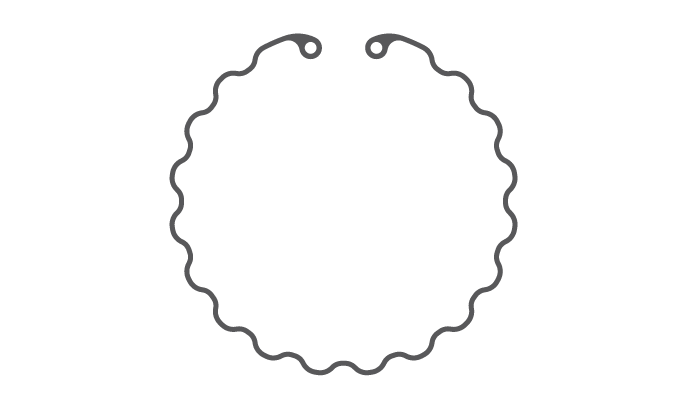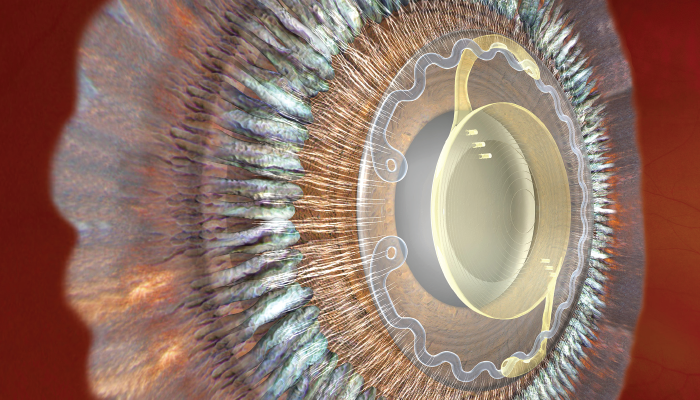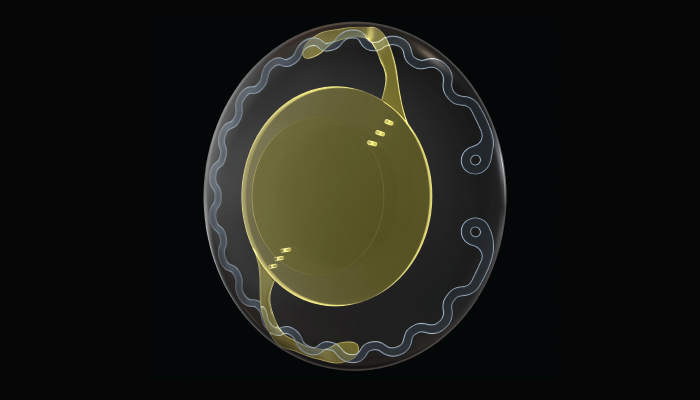
John L. Zdral
Capsular tension rings (CTRs) are indicated to stabilize weakened, broken, or missing zonules, preventing IOL decentration after capsular shrinkage. Composed of clear polymethylmethacrylate (PMMA), a material known for its durability and biocompatibility, CTRs are open-ring devices with blunt tipped eyelets at either end.
CTRs are designed to be implanted into the capsular bag and left permanently in place. They work by imparting a radial expansile force to the equator of the capsular bag. This force is equalized throughout the entire zonula-capsule apparatus, thereby transferring the tension from intact and normal zonules to those areas of zonular weakness or absence.
By increasing overall bag stability, the risk of intraoperative complications is reduced. In addition, the tension imparted to the entire bag with a CTR decreases postoperative capsular contraction (phimosis) and improves IOL centration. CTRs have no effect on the refractive results of cataract surgery.

Rotational stability
Rotational stability is critical for the precise alignment of toric IOLs (TIOLs), which are used to correct astigmatism by aligning along a precise axis. Even small deviations from this axis can result in significant reductions in visual acuity.
Studies have shown that rotational misalignment of as little as 10 degrees can reduce astigmatic correction by approximately 33 percent, and in many cases this necessitates surgical intervention to reposition the lens . Rotation usually occurs within the first 24 hours postoperatively and is uncommon after the first week, at which point capsular shrinkage and bioadhesion have likely occurred (1).
The MORCHER® Zdral Type 20 CTR is an innovative solution designed to enhance the rotational stability of TIOLs during and after cataract surgery to ensure optimal outcomes for cataract patients.
The TYPE 20 CTR offers a unique sinusoidal design, which sets it apart from traditional capsular tension rings. The device, which is supplied preloaded on a single-use injector, features 17 indentations along its 12mm diameter, strategically placed to match the dimensions of the terminal haptic bulbs of a toric IOL. These indentations serve as locking grooves, anchoring the IOL in place within the capsular bag and preventing unwanted rotation.
The design ensures the toric lens remains in its intended position, reducing the risk of postoperative misalignment and the need for corrective surgeries.
With the EyeJet® TYPE 20 CTR, the surgeon is able to:
- expand and stabilize the capsular bag
- distribute the pressure to all zonular fibers and prevents one-sided pressure to single zonular fibers
- reduce post-operative capsular bag shrinkage
- facilitate centration of the IOL
- facilitate safe cataract surgery in eyes with weak or partially absent zonules
- facilitate cortical removal.

Credit: MORCHER® GmbH
Clinical evidence
A laboratory study conducted at the John A. Moran Eye Center in Utah compared the performance of the MORCHER® Zdral Type 20 CTR with standard capsular tension rings and no CTR at all (1).
The findings revealed that while a standard CTR did improve rotational stability compared with using no ring, the TYPE 20 CTR provided significantly better results.
The toric IOLs remained securely positioned in the capsular bag, with minimal rotation observed under all conditions. Both AcrySof and TECNIS toric IOLs were tested, and the results were consistent across both brands. The TYPE 20 CTR demonstrated superior performance, significantly restricting the movement of the IOLs and maintaining their alignment during testing. The improved stability of the IOLs was statistically significant, confirming the efficacy of the TYPE 20 CTR in preventing lens misalignment.
Other benefits
In addition to rotational stability, the sinusoidal indentations of the TYPE 20 CTR facilitate easier removal of cortical material during cataract surgery, simplifying the procedure for surgeons and reducing the risk of complications.
The wavelike pattern of the ring also evenly distributes pressure across the zonular fibers, reducing strain on individual fibers and contributing to the overall structural integrity of the capsular bag during and after surgery.
Surgeons can use the TYPE 20 CTR in cases where patients present with weak or partially absent zonules, as the ring helps stabilize and expand the capsular bag. By distributing pressure evenly across the zonular fibers, the ring mitigates the risk of capsular shrinkage and facilitates the accurate centration of the IOL. The TYPE 20 CTR also includes eyelets at both ends, making insertion smoother and more controlled.
Because there are both risks and costs to performing lens repositioning surgery, by reducing the tendency for rotation, the TYPE 20 CTR can potentially lower reoperation rates in patients receiving TIOLs.
With its ability to secure the accuracy and stability of TIOL alignment, resulting in improved refractive success, the the TYPE 20 CTR is an indispensable tool for cataract surgeons in their quest to achieve optimal visual outcomes for patients post-surgery.

Credit: MORCHER® GmbH
* FCI Ophthalmics is the exclusive distributor of MORCHER®
Capsular Tension Rings (CTRs) in the United States.
References
- J Zdral et al., “Rotational stability of toric intraocular lenses with a newly modified capsular tension ring,” J Cataract Refract Surg., 47 (2021). PMID: 33196571.
